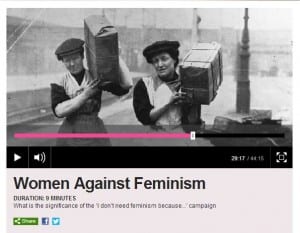 Women Against Feminism on Tumblr suggests feminism. is dead. It seems the feminist movement has divided women against women . The future doesn’t look good for the F word. It’s getting difficult to separate feminist fact from fantasy.
Women Against Feminism on Tumblr suggests feminism. is dead. It seems the feminist movement has divided women against women . The future doesn’t look good for the F word. It’s getting difficult to separate feminist fact from fantasy.
Last week Women’s hour gave airtime to some feminist issues. The 9 minute clip can be heard online.* Ellie Mae O’Hagan argued a gender pay gap exists (see Guardian CIF) while Laura Perrin from The Conservative Woman blog claimed the only reason women get paid less is because they take time out from work to have children. Childcare has always been a a feminist issue. Women Against Feminism was cited as an example of anti-feminist feeling.
Messages on the Tumblr site are mixed. In a world where the internet exposes all aspects of life around the planet, it’s hard to see what appears to be insulation against the greater global picture of gender inequality. Part of this could be Lasch’s Culture of Narcissism and how social media encourages a society of self, but the legacy of early feminism is also to blame. A niche occupation; the stereotype was butch man basher, but the reality more single, childfree, educated, white, western female. Feminism failed to support the role of mother, wife and home-maker. In the 80’s I thought I was feminist until the day I was denied access to a local Women’s Centre because I had my sons with me, while women with daughters could enter. This was the day I thought F**k Feminism, you’re not for me.
I think partly I was relieved. Having halted a career for my family, the unsympathetic portrayal of feminism in the media was unsettling. Early press coverage focussed on negative images and feminists were mocked unsympathetically. Outed as bra-burning, men-haters, female friendships became suspect as men were taught to hate these strident dykes with more hair on their bodies than heads. The labelling of women as feminist soon carried undertones of threat and violence. For evidence of structured inequality of the patriarchal kind, you didn’t need to look much further than this. Feminist calls for political and economic parity came with a price which disguised any genuine ambition for social change and the backlash continues. The female body remains subject to scrutiny. There has never been a more image saturated age and a young girl quickly learns her value is associated with her appearance. It needs sensitive parenting and educated curricula to change dominant cultural attitudes but you can’t call it a feminist agenda any more because feminism is being rewritten and gender discrimination reinvented as victim-hood as evidenced by Women Against Feminism
There are many signs lessons haven’t been learned and the F word is still a dirty one. As a political movement feminism continues to be divisive. Yet fighting gender discrimination is no different to fighting against marginalisation by age, religion, disability or any other cultural category. To make a difference to structural inequality based on sex and gender, feminism this time around needs to be different – for a start it has to cater for all women and include men. But then it wouldn’t be feminism and that is the problem.
* In a perfect example of exclusive and inaccessible practice, The BBC offers no introductory text or transcript. You have to listen.
